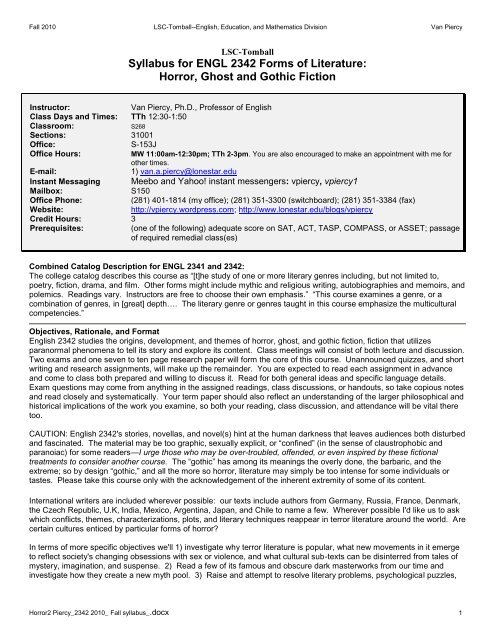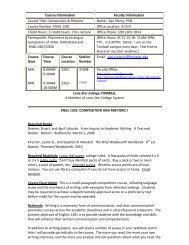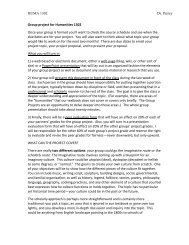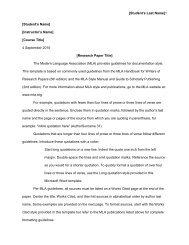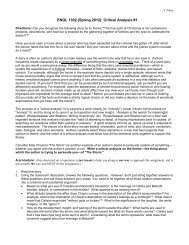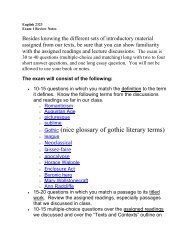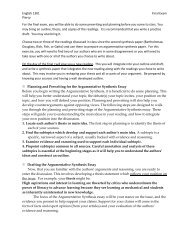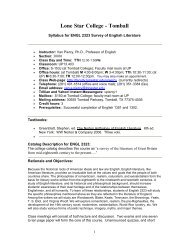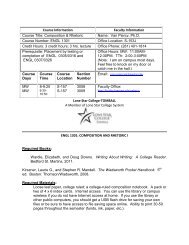English 1301: Composition and Rhetoric I - Van Piercy's Blog
English 1301: Composition and Rhetoric I - Van Piercy's Blog
English 1301: Composition and Rhetoric I - Van Piercy's Blog
You also want an ePaper? Increase the reach of your titles
YUMPU automatically turns print PDFs into web optimized ePapers that Google loves.
Fall 2010 LSC-Tomball--<strong>English</strong>, Education, <strong>and</strong> Mathematics Division <strong>Van</strong> Piercy<br />
LSC-Tomball<br />
Syllabus for ENGL 2342 Forms of Literature:<br />
Horror, Ghost <strong>and</strong> Gothic Fiction<br />
Instructor:<br />
<strong>Van</strong> Piercy, Ph.D., Professor of <strong>English</strong><br />
Class Days <strong>and</strong> Times: TTh 12:30-1:50<br />
Classroom:<br />
S268<br />
Sections: 31001<br />
Office:<br />
S-153J<br />
Office Hours:<br />
MW 11:00am-12:30pm; TTh 2-3pm. You are also encouraged to make an appointment with me for<br />
other times.<br />
E-mail:<br />
1) van.a.piercy@lonestar.edu<br />
Instant Messaging Meebo <strong>and</strong> Yahoo! instant messengers: vpiercy, vpiercy1<br />
Mailbox:<br />
S150<br />
Office Phone:<br />
(281) 401-1814 (my office); (281) 351-3300 (switchboard); (281) 351-3384 (fax)<br />
Website:<br />
http://vpiercy.wordpress.com; http://www.lonestar.edu/blogs/vpiercy<br />
Credit Hours: 3<br />
Prerequisites:<br />
(one of the following) adequate score on SAT, ACT, TASP, COMPASS, or ASSET; passage<br />
of required remedial class(es)<br />
Combined Catalog Description for ENGL 2341 <strong>and</strong> 2342:<br />
The college catalog describes this course as “[t]he study of one or more literary genres including, but not limited to,<br />
poetry, fiction, drama, <strong>and</strong> film. Other forms might include mythic <strong>and</strong> religious writing, autobiographies <strong>and</strong> memoirs, <strong>and</strong><br />
polemics. Readings vary. Instructors are free to choose their own emphasis.” “This course examines a genre, or a<br />
combination of genres, in [great] depth…. The literary genre or genres taught in this course emphasize the multicultural<br />
competencies.”<br />
Objectives, Rationale, <strong>and</strong> Format<br />
<strong>English</strong> 2342 studies the origins, development, <strong>and</strong> themes of horror, ghost, <strong>and</strong> gothic fiction, fiction that utilizes<br />
paranormal phenomena to tell its story <strong>and</strong> explore its content. Class meetings will consist of both lecture <strong>and</strong> discussion.<br />
Two exams <strong>and</strong> one seven to ten page research paper will form the core of this course. Unannounced quizzes, <strong>and</strong> short<br />
writing <strong>and</strong> research assignments, will make up the remainder. You are expected to read each assignment in advance<br />
<strong>and</strong> come to class both prepared <strong>and</strong> willing to discuss it. Read for both general ideas <strong>and</strong> specific language details.<br />
Exam questions may come from anything in the assigned readings, class discussions, or h<strong>and</strong>outs, so take copious notes<br />
<strong>and</strong> read closely <strong>and</strong> systematically. Your term paper should also reflect an underst<strong>and</strong>ing of the larger philosophical <strong>and</strong><br />
historical implications of the work you examine, so both your reading, class discussion, <strong>and</strong> attendance will be vital there<br />
too.<br />
CAUTION: <strong>English</strong> 2342's stories, novellas, <strong>and</strong> novel(s) hint at the human darkness that leaves audiences both disturbed<br />
<strong>and</strong> fascinated. The material may be too graphic, sexually explicit, or “confined” (in the sense of claustrophobic <strong>and</strong><br />
paranoiac) for some readers—I urge those who may be over-troubled, offended, or even inspired by these fictional<br />
treatments to consider another course. The “gothic” has among its meanings the overly done, the barbaric, <strong>and</strong> the<br />
extreme; so by design “gothic,” <strong>and</strong> all the more so horror, literature may simply be too intense for some individuals or<br />
tastes. Please take this course only with the acknowledgement of the inherent extremity of some of its content.<br />
International writers are included wherever possible: our texts include authors from Germany, Russia, France, Denmark,<br />
the Czech Republic, U.K, India, Mexico, Argentina, Japan, <strong>and</strong> Chile to name a few. Wherever possible I'd like us to ask<br />
which conflicts, themes, characterizations, plots, <strong>and</strong> literary techniques reappear in terror literature around the world. Are<br />
certain cultures enticed by particular forms of horror?<br />
In terms of more specific objectives we'll 1) investigate why terror literature is popular, what new movements in it emerge<br />
to reflect society's changing obsessions with sex or violence, <strong>and</strong> what cultural sub-texts can be disinterred from tales of<br />
mystery, imagination, <strong>and</strong> suspense. 2) Read a few of its famous <strong>and</strong> obscure dark masterworks from our time <strong>and</strong><br />
investigate how they create a new myth pool. 3) Raise <strong>and</strong> attempt to resolve literary problems, psychological puzzles,<br />
Horror2 Piercy_2342 2010_ Fall syllabus_.docx 1
Fall 2010 LSC-Tomball--<strong>English</strong>, Education, <strong>and</strong> Mathematics Division <strong>Van</strong> Piercy<br />
<strong>and</strong> cultural mysteries through close reading, class discussion, oral reports, <strong>and</strong> written analyses. 4) Ask what literary<br />
techniques astonish us, making a story st<strong>and</strong> out among others in its subgenre.<br />
By the end of the semester, you will be able to<br />
<br />
<br />
<br />
<br />
<br />
<br />
<br />
<br />
Trace, interpret, <strong>and</strong> evaluate the cultural <strong>and</strong> literary development, <strong>and</strong> relations between, the subgenres of<br />
“gothic,” “horror,” <strong>and</strong> “ghost” fiction, both in form <strong>and</strong> content, from the late 18 th century through to the present.<br />
Interpret <strong>and</strong> evaluate a literary work through underst<strong>and</strong>ing its theme, situation, tone, structure, <strong>and</strong> style.<br />
Recognize the aesthetic, moral, <strong>and</strong> intellectual values of the literature by applying <strong>and</strong> comparing relevant<br />
cultural contexts.<br />
Recognize some of the major themes of the literature.<br />
Underst<strong>and</strong> the distinguishing characteristics of various subgenres of “gothic,” “horror,” <strong>and</strong> “ghost” fiction.<br />
Analyze texts logically in the context of writers’ diverse cultural backgrounds, values, <strong>and</strong> intertextual<br />
relationships.<br />
Write logical, well-organized, well-supported critical responses to literary works <strong>and</strong> show show a familiarity with<br />
important scholarly commentary on those works.<br />
Follow MLA guidelines in documenting sources<br />
Required Materials<br />
Baldick, Chris, ed. The Oxford Book of Gothic Tales. New York: Oxford, 1992, 2001, 2009.<br />
Cuddon, J. A., ed. The Penguin Book of Horror Stories. New York: Penguin, 1984.<br />
Olson, Danel, ed. Exotic Gothic 3. Ashcroft, British Columbia: Ash Tree Press, 2010.<br />
Ryan, Alan. The Penguin Book of Vampire Stories. New York: Penguin, 1987.<br />
Evaluation <strong>and</strong> Letter Grade Assignment<br />
Two in-class papers = 10%<br />
Draft of research paper = 5%<br />
Research paper = 25%<br />
Midterm Exam = 25%<br />
Final exam = 25%<br />
Quizzes <strong>and</strong> in-class work = 10%<br />
Total = 100%<br />
A = 90-100 B = 80-89 C = 70-79 D = 60-69 F = 0-59<br />
Late Work<br />
Essays are due at the beginning of class. If the essay is not complete <strong>and</strong> printed out, you will have to turn in the essay at<br />
the beginning of the next class period; the essay will be considered late. Only under special circumstances <strong>and</strong> only then<br />
if you make prior arrangements with me, will I consider accepting essays e-mailed to me or turned in to my mailbox.<br />
Regardless of the reason, five (5) points per class period will be deducted from late out-of-class papers unless, no later<br />
than the day before the paper is due, you make arrangements for an extension. Unless I indicate otherwise, an essay<br />
granted an extension must be turned in the following class period, after which the essay will be counted late. Finally,<br />
UNLESS YOU MAKE SPECIAL ARRANGEMENTS WITH ME AHEAD OF TIME, EXAMS AND QUIZZES CANNOT BE<br />
MADE UP OR TURNED IN LATE I.E. YOU WILL RECEIVE A ZERO FOR THAT ASSIGNMENT.<br />
Research paper<br />
A student who does not h<strong>and</strong> in a complete <strong>and</strong> acceptable research paper may receive a zero for the<br />
assignment. The requirements for the research paper are provided in more detail on the course website linked from<br />
http://faculty.lonestar.edu/vpiercy, but part of what constitutes a complete <strong>and</strong> acceptable paper is that it is a minimum<br />
Horror2 Piercy_2342 2010_ Fall syllabus_.docx 2
Fall 2010 LSC-Tomball--<strong>English</strong>, Education, <strong>and</strong> Mathematics Division <strong>Van</strong> Piercy<br />
of 1500 words (excluding title page <strong>and</strong> Works Cited page) long <strong>and</strong> that it utilizes at least 7 acceptable secondary<br />
sources.<br />
Essay Formatting<br />
1. All essays written outside of class must be typed. They should be double-spaced with one-inch margins <strong>and</strong> 10-<br />
12 point font. Computers are available in E268, the Learning Assistance Center, <strong>and</strong> the library; printing costs ten<br />
cents per page.<br />
2. It is your responsibility to have a copy of your essay in case one of us loses it.<br />
3. Staple (once) pages together in the upper left-h<strong>and</strong> corner, <strong>and</strong> please do it before class begins.<br />
4. The following information should appear in the upper right-h<strong>and</strong> corner of in-class work <strong>and</strong> on the title page of<br />
out-of-class essays:<br />
o Your name<br />
o Class <strong>and</strong> time<br />
o Piercy<br />
o Date<br />
Classroom expectations<br />
1. Don’t be rude to others. There is to be no reading of newspapers, PDAs (e.g., Palm Pilots), text messages, or<br />
other non-class related materials while class is being conducted. Cellular phones <strong>and</strong> pagers are to be silenced<br />
<strong>and</strong> put out of sight.<br />
2. Avoid coming to class late. If you come to class late, please get class notes from someone besides me.<br />
3. Please come prepared. Read the assignments before class. Do the assigned homework so that you may<br />
participate fully in class discussion.<br />
4. I do not mind if you have a drink or a coke or a cup of coffee <strong>and</strong> a snack bar or something that you can eat<br />
quietly without drawing attention to yourself, but please do not bring a full lunch to class (whether that includes a<br />
s<strong>and</strong>wich or plate of food or box of chicken with sides, along with bag of chips, drink, etc.). Please treat our<br />
classroom <strong>and</strong> those within it in a professional <strong>and</strong> serious <strong>and</strong> respectful manner.<br />
Attendance Policy<br />
One of the keys to success in this course is consistent attendance. Listed below are the number of absences you are<br />
allowed. If you are absent more than that number, you will lose two points to your final grade for each extra day that you<br />
miss. 1 In addition, I may choose to drop you from the class because of excessive absences. Any variations from this<br />
policy are strictly at my discretion. If you are late four times, that will count as an absence.<br />
Class Schedule<br />
Number of Absences Allowed<br />
MWF 5<br />
TTh or MW 3<br />
Summer 2<br />
Once a week 2<br />
If you should miss a class, it is your responsibility to obtain lecture notes <strong>and</strong> assignments from a classmate.<br />
Withdrawal Policy<br />
Withdrawal from the course after the official day of record (see current catalog) will result in a final grade of “W” on the<br />
student transcript <strong>and</strong> no credit will be awarded. If you decide you want to withdraw from the class before "W" day, it is<br />
your responsibility to go to the admissions office <strong>and</strong> ask for a drop slip. Do not just stop coming to class <strong>and</strong> expect me<br />
to drop you.<br />
1<br />
For example, if you miss a total of ten days for a MWF class, you will have exceeded the number of allowed absences by five days<br />
<strong>and</strong> effectively decreased the best grade you can get in the class to a “B.”<br />
Horror2 Piercy_2342 2010_ Fall syllabus_.docx 3
Fall 2010 LSC-Tomball--<strong>English</strong>, Education, <strong>and</strong> Mathematics Division <strong>Van</strong> Piercy<br />
Academic Integrity:<br />
Below is the LSC statement on academic integrity from the LSC catalog:<br />
LSC is committed to a high st<strong>and</strong>ard of academic integrity in the academic community. In becoming a<br />
part of the academic community, students are responsible for honesty <strong>and</strong> independent effort. Failure to<br />
uphold these st<strong>and</strong>ards includes, but is not limited to, the following: plagiarizing written work or projects,<br />
cheating on exams or assignments, collusion on an exam or project, <strong>and</strong> misrepresentation of credentials<br />
or prerequisites when registering for a course. Cheating includes looking at or copying from another<br />
student's exam, orally communicating or receiving answers during an exam, having another person take<br />
an exam or complete a project or assignment, using unauthorized notes, texts, or other materials for an<br />
exam, <strong>and</strong> obtaining or distributing an unauthorized copy of an exam or any part of an exam. Plagiarism<br />
means passing off as his/her own the ideas or writings of another (that is, without giving proper credit by<br />
documenting sources). Plagiarism includes submitting a paper, report or project that someone else has<br />
prepared, in whole or in part. Collusion is inappropriately collaborating on assignments designed to be<br />
completed independently. These definitions are not exhaustive. When there is clear evidence of<br />
cheating, plagiarism, collusion or misrepresentation, a faculty member will take disciplinary action<br />
including but not limited to requiring the student to retake or resubmit an exam or assignment, assigning a<br />
grade of zero or "F" for an exam or assignment; or assigning a grade of "F" for the course. Additional<br />
sanctions including being withdrawn from the course or program or expelled from school may be imposed<br />
on a student who violates the st<strong>and</strong>ards of academic integrity. (Emphasis added)<br />
In most cases in my class, intentional cheating, plagiarism, or collusion will result in an "F" in the course.<br />
Requirements Met<br />
This course fulfills either the LSC sophomore literature or humanities requirement along with the<br />
multicultural requirement (that is, the course satisfies two requirements, only one of which can be literature or<br />
humanities).<br />
ENGL 2342 Horror, Ghost & Gothic Fiction Syllabus<br />
Tues/Thurs Tentative Schedule (Fall 2010)<br />
NOTE: All reading <strong>and</strong> writing assignments are to be completed on or before the date on which they appear on<br />
the schedule. It is a good idea to mark the due dates of major assignments from all your classes so that you can<br />
see what weeks will be especially busy. Also, expect a quiz over each story (that means there may not always be<br />
a quiz but that you should be prepared for one). (G = The Oxford Book of Gothic Tales, H = The Penguin Book of Horror<br />
Stories)<br />
WEEK 1<br />
Aug. 31<br />
<br />
Sept. 2<br />
<br />
<br />
<br />
WEEK 2<br />
Sept. 7<br />
<br />
<br />
<br />
Introduction to the course; discuss expectations, questions, <strong>and</strong> papers, <strong>and</strong> the some opening genre distinctions.<br />
"Introduction" to The Oxford Book of Gothic Tales (G), pp. xi-xxiii<br />
G pp. 82-84 J. Wadham, “Lady Eltringham….”<br />
G pp. 3-6 Anna Laetitia Aikin, “Sir Bertr<strong>and</strong>”<br />
G pp. 70-81 Petrus Borel, "Andreas Vesalius the Anatomist"<br />
G pp. 435-465 Ray Russell, "Sardonicus"<br />
G pp. 218-244 Thomas Hardy, “Barbara of the House of Grebe”<br />
Horror2 Piercy_2342 2010_ Fall syllabus_.docx 4
Fall 2010 LSC-Tomball--<strong>English</strong>, Education, <strong>and</strong> Mathematics Division <strong>Van</strong> Piercy<br />
Sept. 9<br />
<br />
<br />
<br />
WEEK 3<br />
Sept. 14<br />
G pp. 12-22 Anon. “The Friar’s Tale”<br />
G pp. 23-26 “Juvenis,” "Raymond: A Fragment"<br />
G pp. 51-59 Isaac Crookenden, “The Vindictive Monk….”<br />
G pp. 85-101 Edgar Allan Poe, “The Fall of the House of Usher”<br />
"Introduction" to The Penguin Book of Horror (H) pp. 11-58<br />
H pp. 59-61 Anon. “The Monk of Horror….”<br />
Sept. 16<br />
<br />
WEEK 4<br />
Sept. 21<br />
<br />
<br />
<br />
Sept. 23<br />
<br />
<br />
WEEK 5<br />
Sept. 28<br />
<br />
<br />
Sept. 30<br />
<br />
<br />
WEEK 6<br />
Oct. 5<br />
Oct. 7<br />
Short Story Analysis #1 (written in class)<br />
H pp. 97-113 Balzac, “Le Gr<strong>and</strong>e Bretêche”<br />
G pp. 158-164 Bret Harte, "Selena Sedilia"<br />
H pp. 78-88 Prosper Mérimée, “Mateo Falcone”<br />
V pp. 1-6 Lord Byron, “Fragment of a Novel,” Penguin Book of Vampire Stories (V)<br />
V pp. 7-24 John Polidori, “The Vampyre”<br />
V pp. 203-213 Algernon Blackwood, “The Transfer”<br />
V pp. 25-35 “Varney the Vampyre, Or, The Feast of Blood”<br />
V pp. 334-348 Fritz Leiber, “The Girl With The Hungry Eyes”<br />
V pp. 138-162 Mary Elizabeth Braddon, “Good Lady Ducayne”<br />
V pp. 451-504 Chelsea Quinn Yarbro, “Cabin 33”<br />
V pp. 441-450 Charles Grant, “Love Starved”<br />
<br />
<br />
WEEK 7<br />
Oct. 12<br />
<br />
Oct. 14<br />
<br />
<br />
WEEK 8<br />
Oct. 19<br />
<br />
H pp. 131-141 Guy de Maupassant, “Who Knows?”<br />
H pp. 391-401 Lord Dunsany, “The Two Bottles of Relish"<br />
V pp. 72-137 J. Sheridan Le Fanu, “Carmilla”<br />
G pp. 249-263 Charlotte Perkins Stetson, “The Yellow Wall-Paper”<br />
G pp. 316-321 H. P. Lovecraft, “The Outsider”<br />
Midterm Review<br />
Horror2 Piercy_2342 2010_ Fall syllabus_.docx 5
Fall 2010 LSC-Tomball--<strong>English</strong>, Education, <strong>and</strong> Mathematics Division <strong>Van</strong> Piercy<br />
Oct. 21<br />
No class<br />
WEEK 9<br />
Oct. 26<br />
Midterm Exam<br />
Oct. 28<br />
H pp. 545-556 Dorothy K. Haynes, “Thou Shalt Not Suffer a Witch…”<br />
H pp. 510-520 Ray Bradbury, “The Dwarf”<br />
H pp. 587-598 J. N. Allan, “The Aquarist”<br />
WEEK 10<br />
Nov. 2<br />
G pp. 407-423 Frederick Cowles, "The Vampire of Kaldenstein"<br />
G pp. 502-518 Patrick McGrath, “Blood Disease”<br />
Nov. 4<br />
G pp. 386-406 F. M. Mayor, “Miss de Mannering of Asham”<br />
G pp. 466-477 Alej<strong>and</strong>ra Pizarnik, "The Bloody Countess"<br />
H pp. 254-276 Franz Kafka, “In the Penal Colony”<br />
WEEK 11<br />
Nov. 9<br />
G pp. 483-497 Angela Carter, “The Lady of the House of Love”<br />
G pp. 498-501 Joyce Carol Oates, “Secret Observations on the Goat-Girl”<br />
G pp. 302-315 Ellen Glasgow, “Jordan’s End”<br />
Nov. 11<br />
Meet in class, then go to N-103 for Calliope readings.<br />
WEEK 12<br />
Nov. 16<br />
In-class response paper #2 (written in class)<br />
Nov. 18<br />
Draft Workshop: Research Paper (response papers returned)<br />
H pp. 361-371 William Faulkner, “Dry September”<br />
H pp. 415-432 Geoffrey Household, “Taboo”<br />
WEEK 13<br />
Nov. 23<br />
Draft of Research paper due (bring 2 copies, typed. Peer critique.)<br />
Latin American Gothic<br />
G pp. 478-482 Jorge Borges, "The Gospel According to Mark"<br />
G pp. 519-526 Isabel Allende, "If You Touched My Heart"<br />
Nov. 25<br />
<br />
No class--holiday<br />
Horror2 Piercy_2342 2010_ Fall syllabus_.docx 6
Fall 2010 LSC-Tomball--<strong>English</strong>, Education, <strong>and</strong> Mathematics Division <strong>Van</strong> Piercy<br />
WEEK 14<br />
Nov. 30<br />
Southern Gothic<br />
G pp. 424-434 Eudora Welty, "Clytie"<br />
G pp. 322-330 William Faulkner, "A Rose for Emily"<br />
Dec. 2<br />
<br />
<br />
<br />
EG3 pp. vii-xi Danel Olson, Preface: “More Shivers <strong>and</strong> Whispers”; <strong>and</strong> Danel Olson, “The Gothic Takes a<br />
Holiday” Preface from Exotic Gothic vii-xi, <strong>and</strong> Preface from Exotic Gothic 2: “A Twenty-first Century Gothic,” pp.<br />
vii-x (h<strong>and</strong>out)<br />
EG3 pp. 66-78 Steve Duffy, “The Suicide Wood”<br />
EG3 pp. 129-145 Isobelle Carmody, “The Stranger”<br />
WEEK 15<br />
Dec. 7<br />
Final Draft of Research paper due<br />
EG3 pp. 195-200 Milorad Pavic, “From Paper Theater”<br />
EG3 pp. 16-27 Lucy Taylor, “Sanguma”<br />
Dec. 9<br />
EG3 pp. 3-15 Robert Hood, “Behind Dark Blue Eyes”<br />
EG3 pp. 79-89 Tunku Halim, “Keramat”<br />
Review for Final Exam<br />
WEEK 16<br />
Final exam<br />
Thursday, Dec. 16, 12:30 P.M.-2:20 P.M.<br />
Horror2 Piercy_2342 2010_ Fall syllabus_.docx 7


